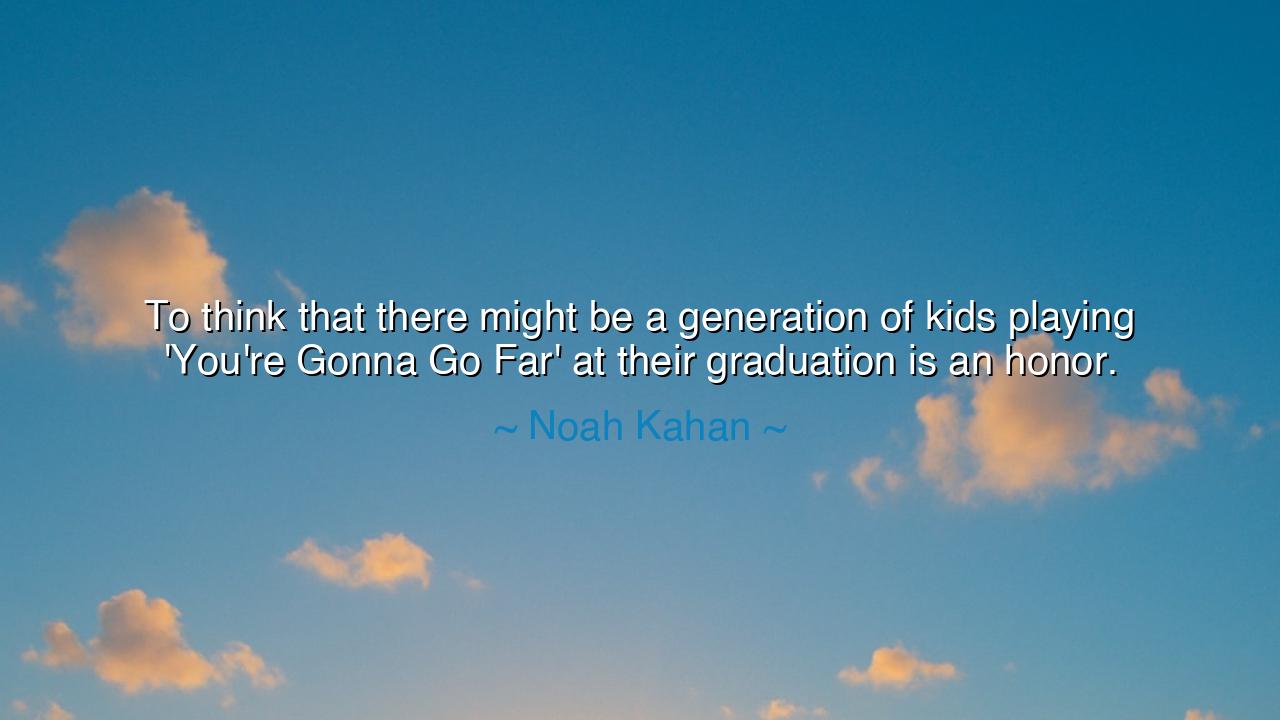
To think that there might be a generation of kids playing 'You're
To think that there might be a generation of kids playing 'You're Gonna Go Far' at their graduation is an honor.






The words of Noah Kahan — “To think that there might be a generation of kids playing ‘You’re Gonna Go Far’ at their graduation is an honor.” — carry the tenderness of remembrance and the strength of hope. Beneath their gentle humility lies a truth that echoes through the ages: that art, when born of honesty, becomes more than expression — it becomes inheritance. It is a bridge between generations, a song carried forward by those who were not yet born when it was written. In his reflection, Kahan reveals the quiet wonder of the creator who realizes that his work has transcended himself — that it has entered the lives of others as a companion to their own journey of becoming.
The song he speaks of, “You’re Gonna Go Far,” is itself a message of farewell and faith — a blessing for those stepping out into the uncertain world. When the artist imagines children standing in cap and gown, the song swelling behind their dreams, he sees the fulfillment of art’s highest calling: to give courage to the next generation. For what is graduation but the ancient ritual of departure — a moment when the young, standing at the threshold of life, look forward with trembling hearts, unsure of the road ahead? In that sacred hour, a song becomes a torch. Its melody whispers, “You are ready. Go forth.”
From the dawn of time, the poets and musicians have served as torchbearers for the spirit. When Homer sang of Odysseus’s journey home, it was not only for his own time, but for every wanderer who would one day seek meaning in the unknown. When Tagore wrote “Where the mind is without fear and the head is held high,” he wrote not only for India, but for the boundless courage of all who dream of freedom. In the same way, Noah Kahan’s reflection is not just about a song — it is about the sacred duty of the artist: to give voice to the human passage from innocence to purpose, from youth to destiny.
There is something deeply ancient in the image of music accompanying transition. In old villages, when a young person left home for marriage, war, or study, the elders would gather to sing songs of blessing. These songs were not mere entertainment; they were emotional armor, woven from love and memory. They reminded the traveler that even in distance, they carried the voices of home within them. So when modern graduates play “You’re Gonna Go Far”, they are enacting the same timeless ritual — the song becomes the voice of the world bidding them strength, reminding them that courage is born not of certainty, but of connection.
Kahan’s words also speak of humility, the mark of every true artist. To call it an honor — that his song might accompany others — shows that he sees his work not as ownership, but as offering. The artist who releases his creation into the world releases a part of his soul, and when it takes root in the lives of strangers, it ceases to belong to him alone. This is how legacy is born — not through monuments or fame, but through the quiet persistence of something that continues to give comfort and strength long after its maker has moved on.
The story of Noah Kahan thus mirrors the story of countless creators before him who gave their work to the future. Think of Beethoven, who could no longer hear the music he wrote, yet poured into his final symphonies a vision of humanity’s shared triumph. Or of Anne Frank, who wrote her thoughts into a diary not to be remembered, but to understand — and whose words became a beacon for millions seeking courage in despair. The artist never truly knows how far their work will travel. But the hope that it might carry others forward — that it might help someone go far — is the deepest fulfillment of their calling.
And so, the lesson in these words is clear: create with sincerity, and let go with grace. Whether you write, teach, love, or build — whatever your craft may be — do it with a heart that seeks not recognition, but connection. Know that your actions, your kindness, your words may become the music played at someone else’s turning point. You may never witness it, but you will have shaped it.
Let this be your practice, O seeker of meaning: do your work with love, and trust that it will travel beyond you. For one day, years hence, when another generation takes its first step into the unknown, they may carry something of your spirit — a word, a gesture, a melody — as their guide. And that, as Noah Kahan reminds us, is the greatest honor of all: not that we go far ourselves, but that through us, others do.






AAdministratorAdministrator
Welcome, honored guests. Please leave a comment, we will respond soon